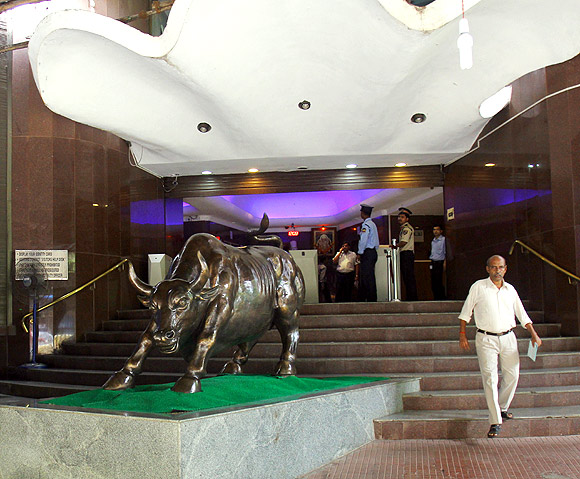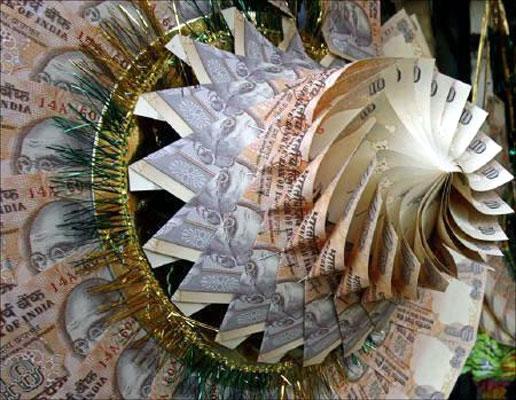Photographs: Hitesh Harisinghani/Rediff.com Devangshu Datta in New Delhi
Mass downgrades of GDP projections make it likely that there will be another wave of FII selling fairly soon
The Q1 gross domestic product (GDP) data released last Friday indicated that the economy continues to decelerate.
The positive side to this is that this will result in some compression of imports and a drop in the volume of external commercial borrowing. Exports should also improve, given a weaker rupee. Those trends should together reduce the current account deficit (CAD) to some extent.
The negative aspect of course, is that slower growth coupled to high inflation means more pain for everyone who lives in India.
At the micro-level, we should have suspected this was coming, given that the Q1 corporate data had resulted in far more downgrades than upgrades.
...
Why the market rally is likely to be short-term
Photographs: Reuters
The consensus for the Nifty basket (which has seen re-adjustment with stocks being replaced) is that 2013-14 earnings will grow at a nominal three per cent.
The GDP data has now triggered off a sequence of top-down downgrades for India's macro-economic growth projections.
BNP Paribas had shocked everyone by coming through with a pre-Friday estimate of 3.7 per cent GDP growth for 2013-14. That is the lowest estimate at the moment.
But every major institution has cut estimates after Friday's data. The most optimistic of the estimates would probably be CLSA, which has cut estimates from 5.5 per cent GDP growth to 5.2 per cent.
Most of the estimates are in the range of 4.25 per cent to 4.75 per cent GDP growth.
Why the market rally is likely to be short-term
Photographs: Reuters
Part of the problem of assessing India's growth rates and economic trends is methodological.
India uses the Wholesale Price Index (WPI) as its GDP-deflator to strip inflation off and assess real growth. Most national accounts use the respective Consumer Price Indices (CPI) and this means an apple for oranges comparison results.
The differential between the CPI and the WPI is huge in India, with CPI running at over four per cent above WPI. If the Indian CPI was used as the deflator, GDP growth would be negative, and by that method, India has been in deep recession for over a year.
Without getting into the argument about which deflator is more “correct”, one has to note two things. As far as individual Indians are concerned, recessive conditions are indeed in evidence – personal consumption has crashed due to this.
...
Why the market rally is likely to be short-term
Photographs: Reuters
Second, although they may be too politically correct to point it out, overseas investors will make that WPI-CPI adjustment in their internal calculations and come to gloomy conclusions.
Coupled to the specifics of earnings downgrades, the mass downgrades of GDP projections make it likely that we'll see another wave of FII selling fairly soon. The sooner the better really, as far as value-investors are concerned. There's little doubt that the market is over-valued at current levels.
One can find all sorts of technical explanations for a market that continues to rise after disappointing news. But the rise is likely to be short-term given the strength and the long-term nature of the factors acting against the Indian economy.
The author is a technical and equity analyst.






article